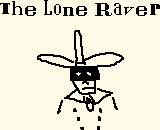Meanwhile, Back At the Ranch, Tonto (Disguised
As A Cigarette) Was Getting His Butt Stomped
From an early age, I've been puzzled by our language. Way back
in the dark ages of the good old days, when I was unraveling the purposes
of the various parts of my body, I concluded that thinking happened in
my nose. The conclusion was logical, given two considerations.
First, I was aware of only those parts of my body that I could see or touch.
At that age, no one knows about his brain. Second, I was tricked
by the language, with which I was already struggling. I'd heard such
things as, "a smart man knows a lot." I missed the distinction between
knows
and nose.
I also misunderstood the word understand. When my mother
commented that she didn't understand something, it made perfectly good
sense to me. I could stand under the table quite easily but she obviously
couldn't because she was too tall. Today, I wonder why we call it
a building long after they're through building it. Why don't
we call it a built? Flies fly. Why don't birds
bird?
Or better yet, why aren't all flying things called flies? Why does
your nose run and your feet smell? Oranges are orange. Why
aren't apples called reds? Why do we call the part you sit
on your bottom? Your feet are lower down than your bottom, so shouldn't
they be the bottom? Why is a court brief so long? If
hens roost and roosters crow, then what do crows do?
Why is a man on a horse called a cowboy, a horseman, or even
a cowman, but never a horseboy? Why is it that a female
actor is an actress but a female adult isn't an adulteress?
Sometimes. Why are there schools of fish, gaggles of
geese, herds of cows, excuse me cattle, coveys of quail,
prides
of lions, and bunches of everything else, except for
flocks
of birds? And what about bunches of grapes and bananas, which
aren't the same as those other bunches? Why do female dogs, but male
ducks, geese, and chickens get special names designating gender?
Our ability to understand things is conditioned by our language.
No wonder we're confused.
As an exercise, try to think of something, a concept, an action, a thing,
for which you don't have a name. It's difficult. Yet, there
are hundreds of concepts, actions, and things that exist besides those
for which you have nouns or verbs. Why can't you think of one?
Here's one for you. It's a simple concept but one that isn't generally
used. In the generic sense, what do you call something to write with?
It could be a pen, a pin, a pencil, a chalk, a lipstick, a burnt stick,
an unburned stick in the dirt, a keyboard, or anything else that you can
write with. Everybody has had one version or another of this conversation:
Speaker 1: Will you loan me a pencil?
Speaker 2: All I have is a pen.
Speaker 1: That's alright. Just something to write with.
Why have we never conceptualized a generic writing implement?
Because nobody ever invented a word for it? Probably. Communication
and understanding are made possible by vocabulary, but even more important,
miscommunication and misunderstanding are made possible by the lack of
vocabulary. So, I've coined some words. A
 |
Page 3 |
|


![]()
 Hidden
by the apparent simplicity of that belief is a great fallacy. Opposites
do not define one another. The meaning of a thing isn't contained
within its opposite. Ungood cannot take the place, simultaneously,
of evil, wicked,
unsound,
unwholesome,
baneful,
deleterious,
pernicious,
noisome,
noxious,
and sinful. Meaning can be obscured or lost by a glib or careless
use of negative forms of words to form alleged opposites. And it
doesn't work anyway. Even and odd are opposites, but
uneven
doesn't mean the same thing as odd.
Hidden
by the apparent simplicity of that belief is a great fallacy. Opposites
do not define one another. The meaning of a thing isn't contained
within its opposite. Ungood cannot take the place, simultaneously,
of evil, wicked,
unsound,
unwholesome,
baneful,
deleterious,
pernicious,
noisome,
noxious,
and sinful. Meaning can be obscured or lost by a glib or careless
use of negative forms of words to form alleged opposites. And it
doesn't work anyway. Even and odd are opposites, but
uneven
doesn't mean the same thing as odd.